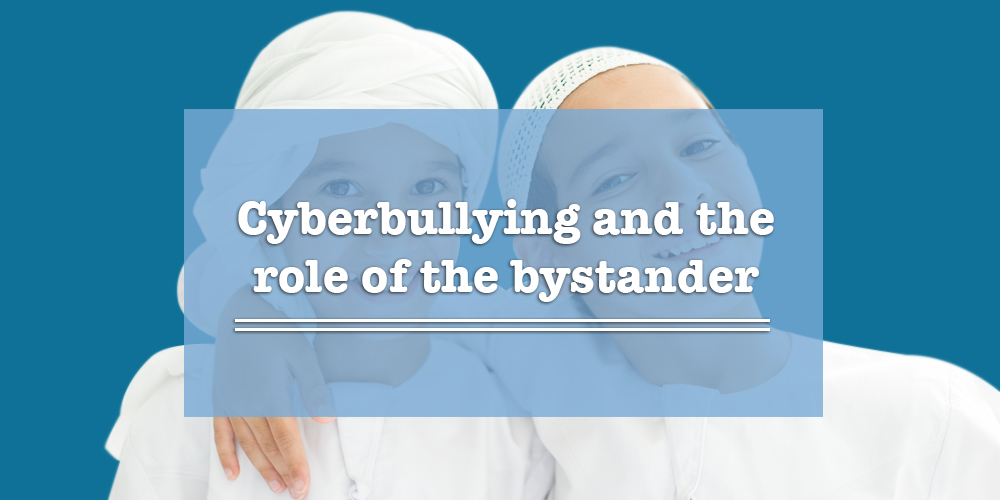What is Cyber Bullying?
Cyber bullying is the use of threatening or mean language to purposely harass or emotionally hurt a single person or group of people. It is carried out in many forms on the Internet, including social media, text messaging, e-mail, chat rooms, discussion groups, or web pages.
Examples of cyber bullying behavior are:
- Teasing and being made fun of;
- Spreading of rumors online;
- Sending unwanted messages; and
- Defamation or putting down or damaging someone’s reputation
Cyber bullying can happen to anyone, and the bully can act anonymously. People can also be bullied online by groups of people such as classmates or collective members of an online community.
The Role of the Bystander in Cyber Bullying
Firstly, what exactly is a bystander?
With regards to cyber bullying, bystanders are people who see what is happening between the bully and the victim but do not get involved in the bullying. If you have been on social media today, you may have seen a few nasty comments on people’s videos or status updates.
What Makes Bystanders Different from a Victim?
As a bystander, you have the option of staying on the outside of the situation; victims of cyber bullying don’t have a choice. Bystanders think that avoiding the conflict altogether is the best decision to make.
How Exactly Is Someone a Bystander?
It is difficult to describe what makes a person a bystander. There are several things a person does, or does not do, that can make them a bystander.
- Purposefully ignoring the event entirely;
- Witnessing the event and choosing not to take the appropriate actions;
- Witnessing the event thinking something on the lines of, “at least that person wasn’t me.”
What is Wrong with Being a Bystander?
Research shows that cyber bullying occurs most frequently in the presence of bystanders. People who refuse to take action when they see something wrong online helps the cyber bully actually feel more powerful than they actually are. Just by being a part of a social media or other online spaces, you encourage cyber bullies to embarrass or threaten their victims because you are not stopping them.
Unfortunately, many people believe that being a bystander is okay. There are many reasons for this.
- Some may believe that the bullying scenario is “none of their business,” and therefore they choose not to take sides because it seems too nosy;
- Others feel that stepping in will make them the new target for the bully, making it seem as though intervening would only make things worse;
- There is also a fear that intervening in a bullying situation by telling a teacher or a counselor will give them the unwanted stigma of being a “tattletale;”
- Bystanders may feel that intervening will also do little. This is especially true in students who have approached teachers before regarding bullying, only to find that no action was taken.
Instead, it is better to take a stand and be an upstander: someone who takes a stand against an act of cyber bullying and does the right thing in the situation.
What Can UPstanders Do to Help Stop Cyber Bullying?
If you are a bystander upstander, then simply reading this is a great first step! Bystanders need to realize that cyber bullying is a serious problem, and that not taking action will only give bullies more opportunities to torment their victims.
About 50% of all bullying events stop when an upstander decides to intervene which just further shows the importance of intervening.
Some Things Bystanders Should Do
Take action by posting words of support for the victim. “I disagree with what’s been said.”
Encourage the victim to seek help. “You are being bullied. Don’t keep what’s happening bottled up inside. Seek help from someone you trust.”
Rally your friends to post comments that show support for the victim.
Alert someone in authority (your teacher, parent, other adult) about what you are observing online or what is being transmitted through cell phones.
Report what you are observing to the security team for the site you are visiting. Facebook provides a number of suggestions depending upon where on the site the abusive content is located.
What Bystanders Should Keep in Mind
- Do not assume that this is a private matter between the bully and the victim. Incidents of bullying, especially those that are frequent, are often not because of personal reasons.
- Do not combat violence with violence. It takes a lot of courage for someone to step up on behalf of a bullied person. However, don’t use insults or threats to defend the victim. Now is not the time to show off. You will most likely only make it harder for the victim.
- Do not get discouraged if you have already talked to teachers or other persons in authority and nothing happened. Keep trying. Teachers and other school authorities will respond if they find out that the bullying is becoming a recurrent problem. Try talking to other teachers and counselors so that you can get more people involved in trying to stop the situation.
- If you feel that this is none of your business, put yourself in the victim’s shoes. Bullying can cause severe anxiety, depression, anger, and frustration in a person, and can turn their life into a nightmare. You wouldn’t want to feel that way.
What If You Step in, and the Bully Tries to Attack You?
You should never step in to protect a bullied victim if it might put your own safety at risk. If this happens, talk to your teacher, counselor, or even the school principal. Be sure to ask if you can speak to them in private, in case you are afraid of being the next target for bullies. Even if you are not directly stopping the bullying, by taking action and going to seek outside help, you are taking steps away from being a bystander… and taking steps towards being an upstander at the same time.




So true. Let’s STOP cyber and physical bullying. Remember: we ar in this TOGETHER